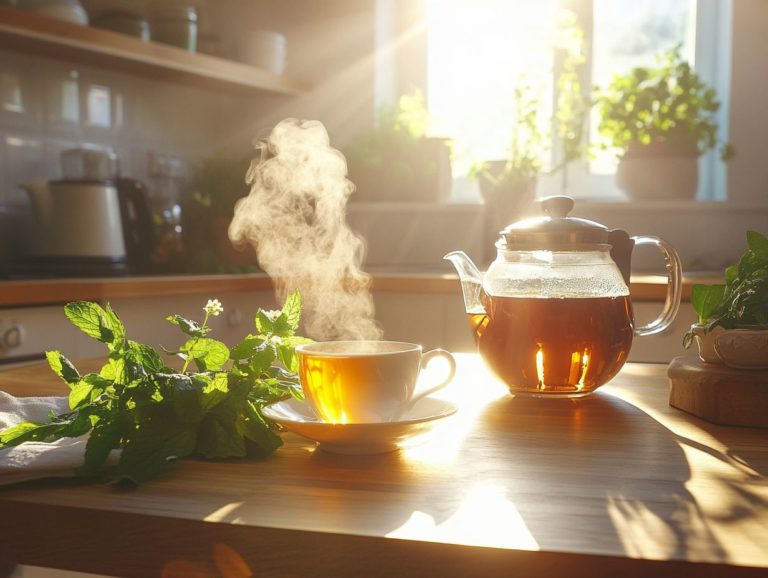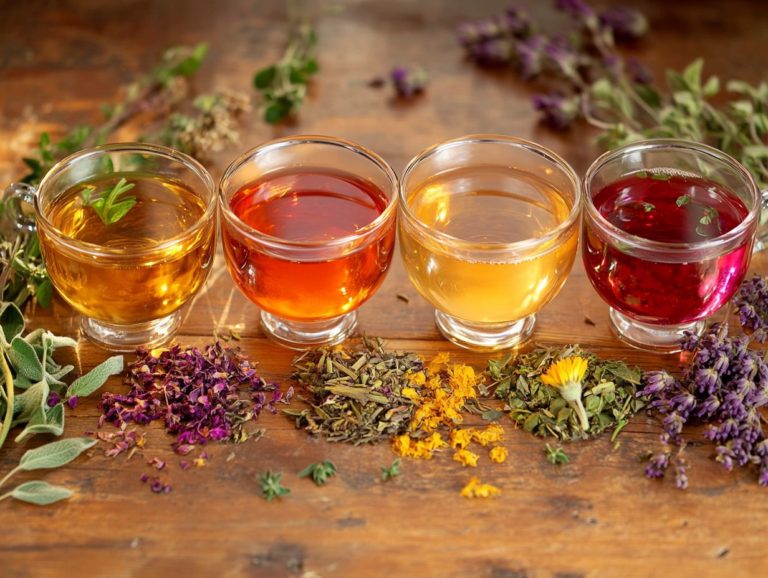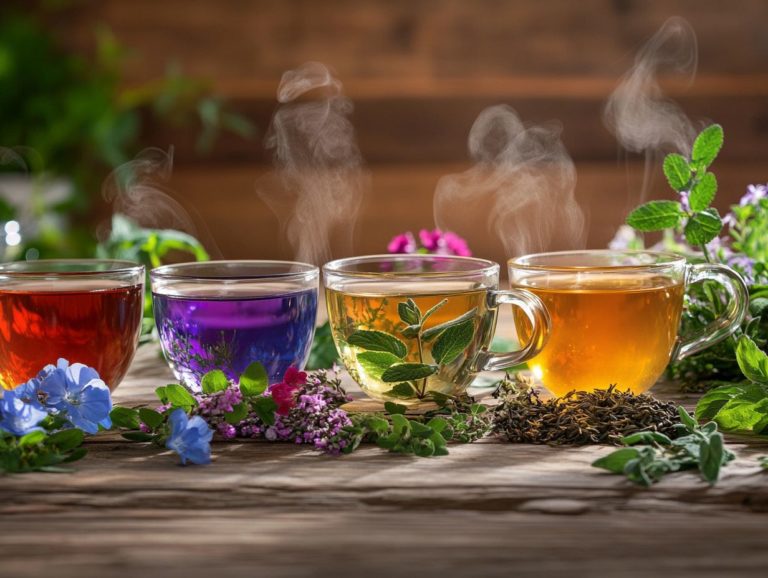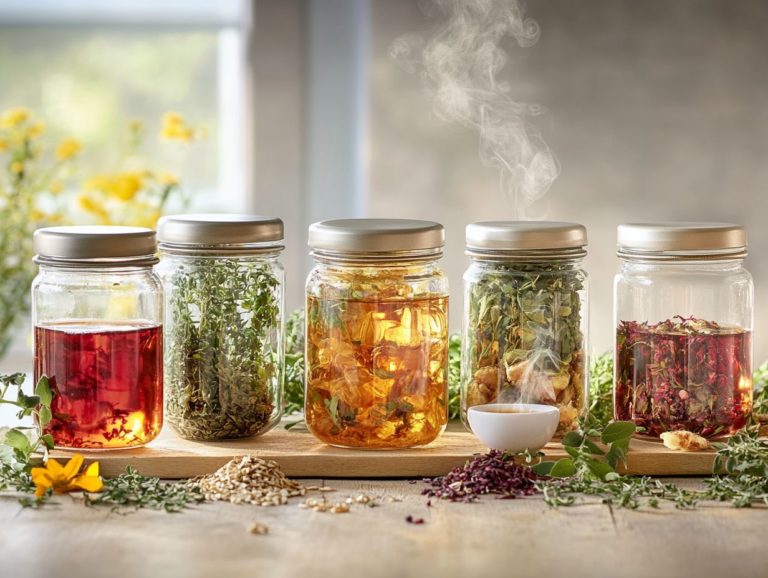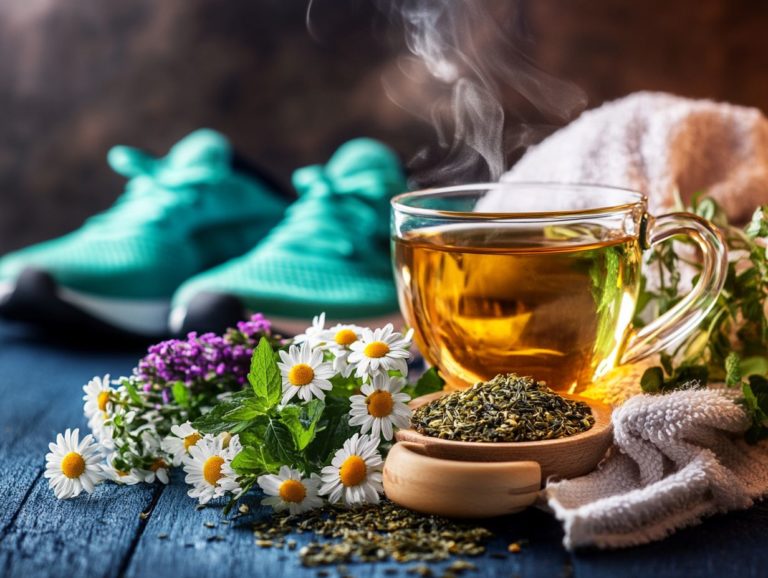Creating Your Own Herbal Tea Garden
Imagine stepping into your backyard and plucking fresh herbs to brew a calming cup of tea. Cultivating your own herbal tea garden enhances your cooking, provides health benefits, and saves you money. It s a delightful retreat that offers many perks.
Learn the essentials of selecting and nurturing the right herbs, paired with effective harvesting and brewing techniques. Uncover innovative ways to savor your herbal creations while ensuring your garden flourishes.
Are you ready to indulge in nature s goodness?
Contents
- Key Takeaways:
- Benefits of Growing an Herbal Tea Garden
- Choosing the Right Herbs for Your Garden
- Harvesting and Drying Herbs for Tea
- Preparing and Brewing Herbal Tea
- Additional Tips for Maintaining Your Herbal Tea Garden
- Frequently Asked Questions
- What is an herbal tea garden and why should I create one?
- What are some common herbs that can be grown in an herbal tea garden?
- How do I start creating my own herbal tea garden?
- What are some tips for maintaining an herbal tea garden?
- Can I use any type of soil for my herbal tea garden?
- What are some ways to use the herbs from my herbal tea garden?
Key Takeaways:
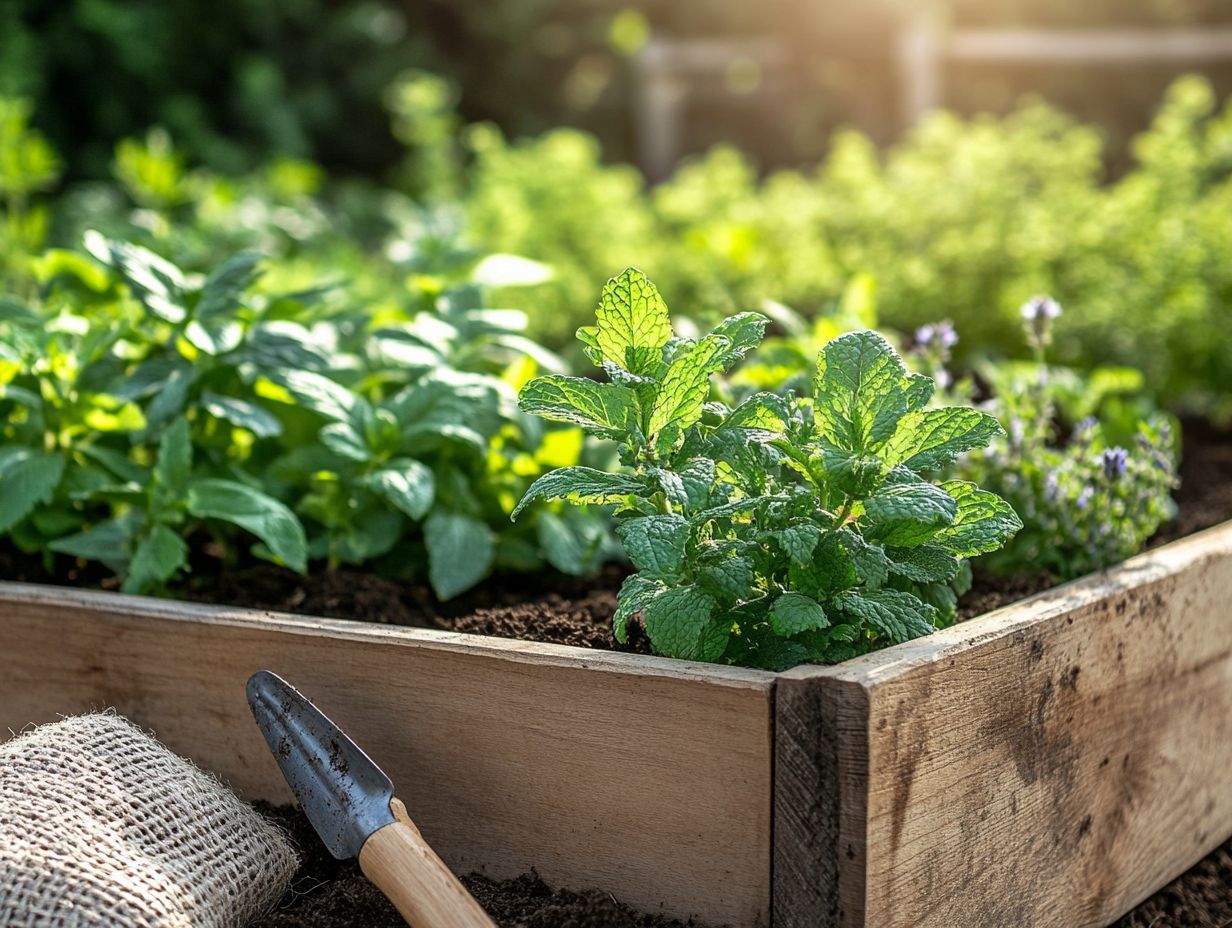
- Enjoy the health benefits of herbal tea by growing your own tea garden at home.
- Choose the right herbs and learn how to harvest and dry them for the perfect cup of tea.
- Maintain your garden with pest control tips and get creative with flavor combinations and recipes for unique tea blends.
Benefits of Growing an Herbal Tea Garden
Cultivating an herbal tea garden elevates your culinary adventures while offering many health benefits and notable cost savings. By nurturing your own fresh herbs like chamomile, mint, and lemon balm, you open the door to a treasure trove of herbal remedies that foster relaxation and enhance your overall well-being.
Tending to your herbal garden becomes a gratifying hobby, deepening your connection with nature and championing sustainable practices. Picture the joy of having fresh, aromatic herbs right at your fingertips! You can craft unique tea blends tailored perfectly to your taste preferences. For guidance, check out this how to make your own herbal tea at home.
Health Benefits of Herbal Tea
Herbal teas such as chamomile, mint, and lemon balm offer an impressive array of health benefits, making them favored choices among herbal aficionados. These soothing infusions provide health benefits that help you feel better, promoting relaxation, improving digestion, and enhancing immune support, all thanks to their rich nutrient profiles and essential oils.
By weaving these calming beverages into your daily routine, you can tap into the natural healing potential these plants offer. Chamomile, renowned for its calming effects, is perfect for promoting restful sleep and alleviating anxiety, making it your ideal nighttime companion.
Mint, on the other hand, is refreshing; its menthol content works wonders for digestion and eases discomfort from bloating or gas. Meanwhile, lemon balm, a delightful member of the mint family, excels at reducing stress and anxiety levels, allowing you to unwind even amid a hectic lifestyle.
Together, these herbal remedies provide a straightforward yet effective means to enhance your overall wellness.
Save Money and Enjoy Fresh Herbs!
Growing your own herbal tea garden can lead to remarkable cost savings and unparalleled convenience compared to purchasing fresh or dried herbs from a health food store. By cultivating a delightful variety of herbs, you ensure a steady supply for your homemade herbal teas, freeing yourself from those frequent trips to the shop.
This practice cuts your spending on herbal products while granting you the luxury of choosing high-quality, organic options without the exorbitant price tag. Picture this: stepping into your garden and snipping a handful of mint or chamomile whenever you crave a soothing cup, and if you want to enhance your brewing skills, check out our guide on how to brew herbal tea with loose leaves, instead of shelling out inflated prices at the market.
The convenience of having an abundant supply at your fingertips means you can effortlessly experiment with different blends and flavors, enriching your tea experiences while enjoying substantial savings over time.
Choosing the Right Herbs for Your Garden
Choosing the right herbs for your herbal tea garden is essential for crafting flavorful and beneficial infusions. Consider popular options like chamomile, celebrated for its soothing qualities, mint, which adds a refreshing twist, and lemon balm, known for its uplifting flavors.
By selecting a diverse array of herbs, you’ll be able to create unique blends tailored to your personal taste and wellness goals.
Popular Herbs for Tea
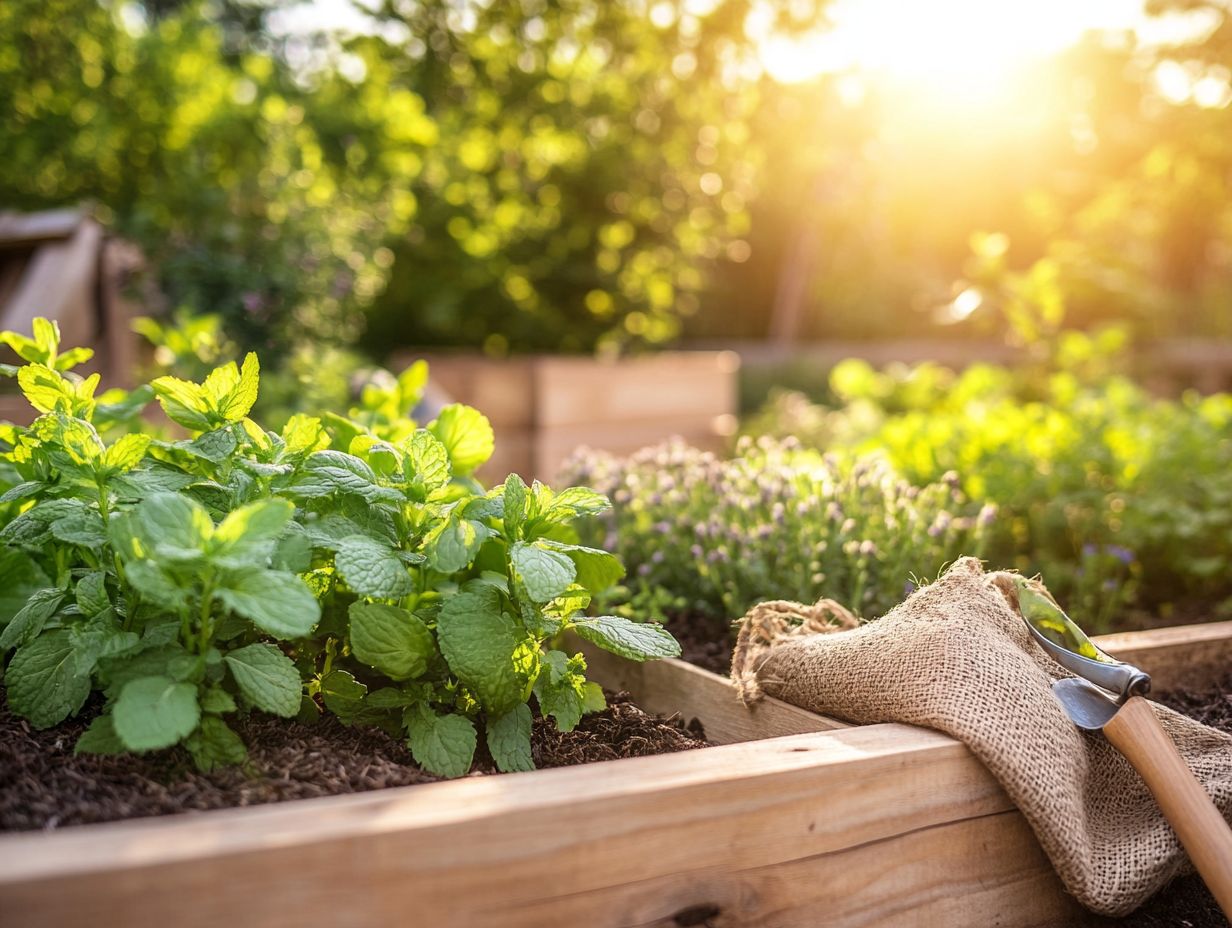
Some of the most beloved herbs for tea that you might consider include chamomile, mint, and lemon balm. Each brings its own unique flavors and health benefits to the table.
Chamomile is widely celebrated for its calming effect, perfect for winding down. Mint invigorates with a refreshing twist, while lemon balm can uplift your mood with its delightful citrusy aroma.
These herbs do more than just contribute distinct tastes to your herbal blends; they also serve various therapeutic purposes. Chamomile, with its sweet, apple-like flavor, is often your go-to choice for promoting sleep and relaxation.
Mint aids digestion and is a favorite companion after meals. Lemon balm has a soothing quality, alleviating anxiety and stress with its cheerful scent.
When you combine these ingredients in herbal teas, you create a delightful symphony of flavors that tantalizes your palate and enhances your overall well-being.
Growing Conditions and Care Tips
Want your herbs to thrive? Understanding the growing conditions and care tips for your herbal tea garden is crucial for cultivating healthy and flavorful herbs.
Most herbs enjoy well-drained soil and plenty of sunlight, making them perfect companions for any tea enthusiast eager to enjoy fresh, organic flavors.
To support optimal growth, consider the specific soil preferences of each herb. Some may flourish in sandy loam, while others prefer the richness of clay.
Lighting is equally important; aim for six to eight hours of direct sunlight, so selecting the right spot in your garden is essential.
Regarding watering, consistency is key. Keep the soil moist, but avoid over-saturating it, as too much water can cause plant roots to decay. Stay vigilant against pests by employing organic methods, such as introducing beneficial insects or using neem oil.
By embracing these practices, you ll cultivate aromatic herbs that elevate your tea experiences to new heights.
Harvesting and Drying Herbs for Tea
Harvesting and drying herbs for tea allows you to savor flavorful and aromatic herbal infusions year-round. By thoughtfully choosing the optimal time to harvest fresh herbs like chamomile and mint, you can successfully preserve their essential oils and medicinal properties.
Methods for Harvesting and Drying
Explore several effective methods for harvesting and drying herbs for tea while preserving their delightful flavors and benefits. Common techniques include snipping the leaves and stems at the right moment.
Your drying options range from classic air drying to using dehydrators (machines that remove moisture) for optimal freshness. To pinpoint the perfect time for harvesting, consider the plant’s overall growth stage alongside the specific herb s peak flavor profile.
Early morning is often ideal, as that s when essential oils are most concentrated. Once you’ve harvested, the drying process becomes crucial.
Hanging bunches upside down in a dark, well-ventilated space allows for slow drying that helps retain both taste and nutritional content. Alternatively, a food dehydrator can effectively lock in those essential flavors and healing properties, ensuring each cup of tea delivers a truly beneficial experience.
Preparing and Brewing Herbal Tea
Preparing and brewing herbal tea requires a nuanced understanding of techniques to extract the finest flavors and benefits from your selected herbs. By using methods such as the infusion method and adhering to proper steeping times, you can craft a delightful experience with each cup.
Customize your herbal blends to reflect your unique taste preferences. Consider crafting your own herbal remedies at home and start your own herbal tea garden today for a fresh and flavorful experience!
Different Brewing Methods
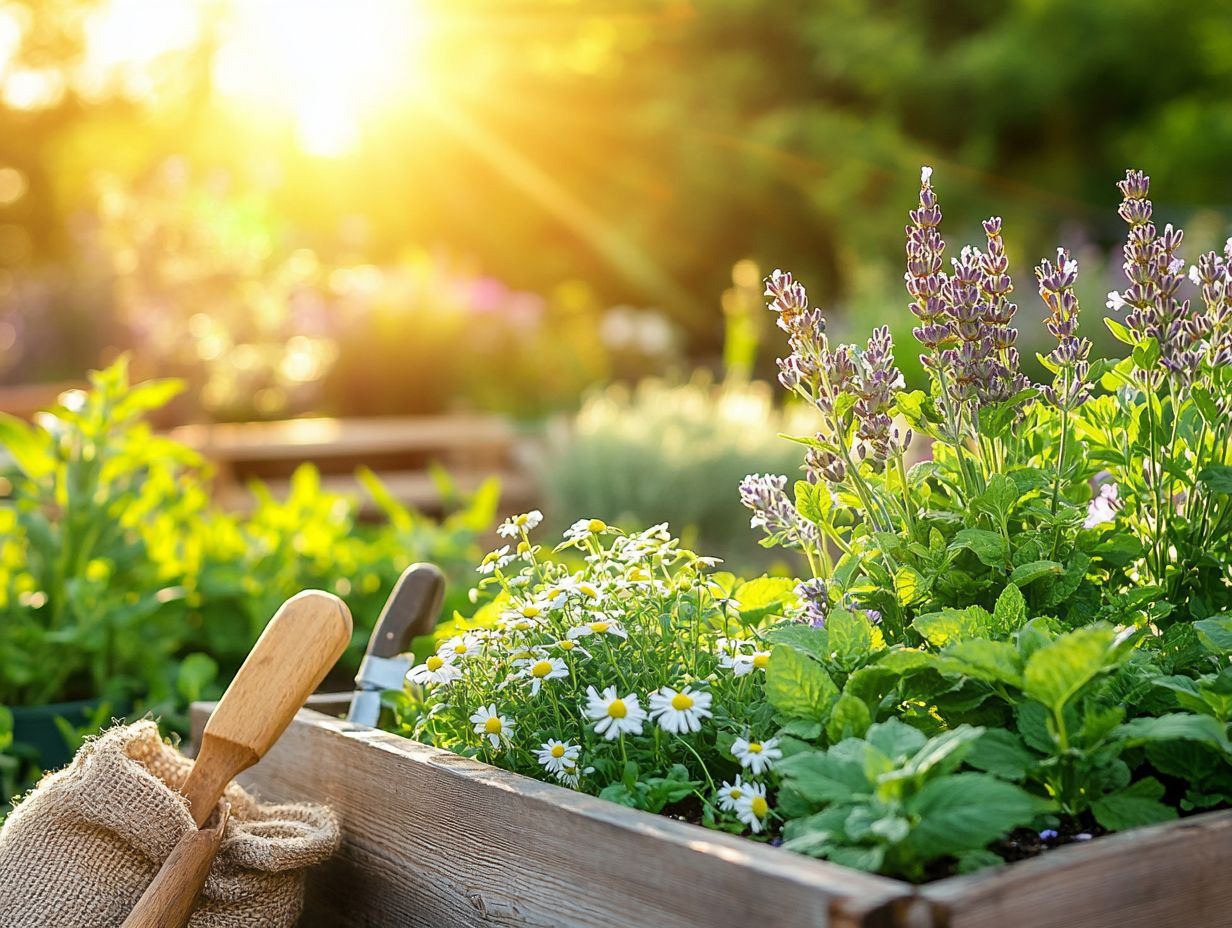
You can choose from various brewing methods to create flavorful herbal teas. Each method offers a unique way to extract the essence of herbs.
The infusion method involves steeping fresh or dried herbs in hot water. This allows the natural oils and flavors to meld beautifully.
Cold brewing and decoction are also essential techniques. Cold brewing gently extracts flavors, making it great for delicate herbs.
Decoction requires simmering tough plant materials, like roots and barks, to unlock their full potential.
Water temperature affects extraction. Lower temperatures preserve subtle notes, while hotter water amplifies bolder flavors.
The steeping time is crucial, too. Longer infusions yield a robust essence, but precise timing avoids bitterness.
Exploring these methods opens a world of possibilities. You can savor your favorite herbal blends like never before.
Flavor Combinations and Recipes
Dive into exciting flavor combinations and recipes! You ll discover delightful and aromatic herbal teas. By mixing various herbs, like chamomile with mint or lemon balm with borage, you can craft unique tea blends that cater to both your taste preferences and health needs.
This journey invites a greater exploration of flavors while unveiling a range of potential health benefits. For instance, the soothing properties of chamomile can help you unwind, while mint adds a refreshing twist and supports digestion. To elevate your experience, consider discovering how to spice up your herbal tea.
If you’re feeling adventurous, why not blend hibiscus with rose hips? This creates a tart yet floral infusion brimming with antioxidants. Step outside your comfort zone by experimenting with different ingredients! And to keep your herbal creations fresh, check out how to store and preserve herbal teas. You might just find your new favorite tea that not only tantalizes your taste buds but also aligns perfectly with your wellness goals.
Additional Tips for Maintaining Your Herbal Tea Garden
Maintaining your herbal tea garden requires diligent care, effective pest control, and creative applications for your herbs. All of these are essential for cultivating a thriving and fruitful environment.
By employing thoughtful practices, you unlock the potential to savor a delightful array of flavors and aromas. This ensures your garden remains both vibrant and productive.
Pest Control and Maintenance
Effective pest control is paramount for maintaining a thriving herbal tea garden. It ensures that your organic herbs remain fresh and vibrant. By regularly monitoring your plants and employing natural pest control methods, you can keep harmful insects at bay while fostering the growth of your desired herbs.
To begin, familiarize yourself with common pests that could affect your plants, such as aphids, spider mites, and caterpillars. Identifying these nuisances early can significantly reduce their potential impact on your garden.
Integrating companion planting strategies serves as a natural deterrent against pests. Utilizing organic pest control methods, like neem oil, insecticidal soap, or introducing beneficial insects such as ladybugs, can further enhance the health of your ecosystem.
Don’t forget to regularly check the soil quality and ensure proper drainage. These practices are crucial for overall maintenance, helping your plants thrive while minimizing the risk of pest infestations.
Creative Uses for Herbs in Tea Blends
The creative use of herbs in tea blends can truly elevate your herbal tea drinking experience. You can enjoy great flavor mixes and plenty of health benefits. Experiment with various herbs. You can craft unique tea blends that match your personal preferences and welfare goals.
Imagine calming chamomile mingling with refreshing mint, or a spicy ginger dancing with zesty lemon. The possibilities are virtually endless. Each herb presents its own distinct profile, delivering not just unique tastes but also a variety of health advantages, from boosting immunity to improving digestion. Dive into the adventure of creating unique blends in your kitchen, and explore 5 delightful DIY herbal teas for wellness!
Consider enhancing your brewing methods by incorporating fresh fruits or spices. This adds a touch of creativity to your afternoon tea ritual.
Frequently Asked Questions
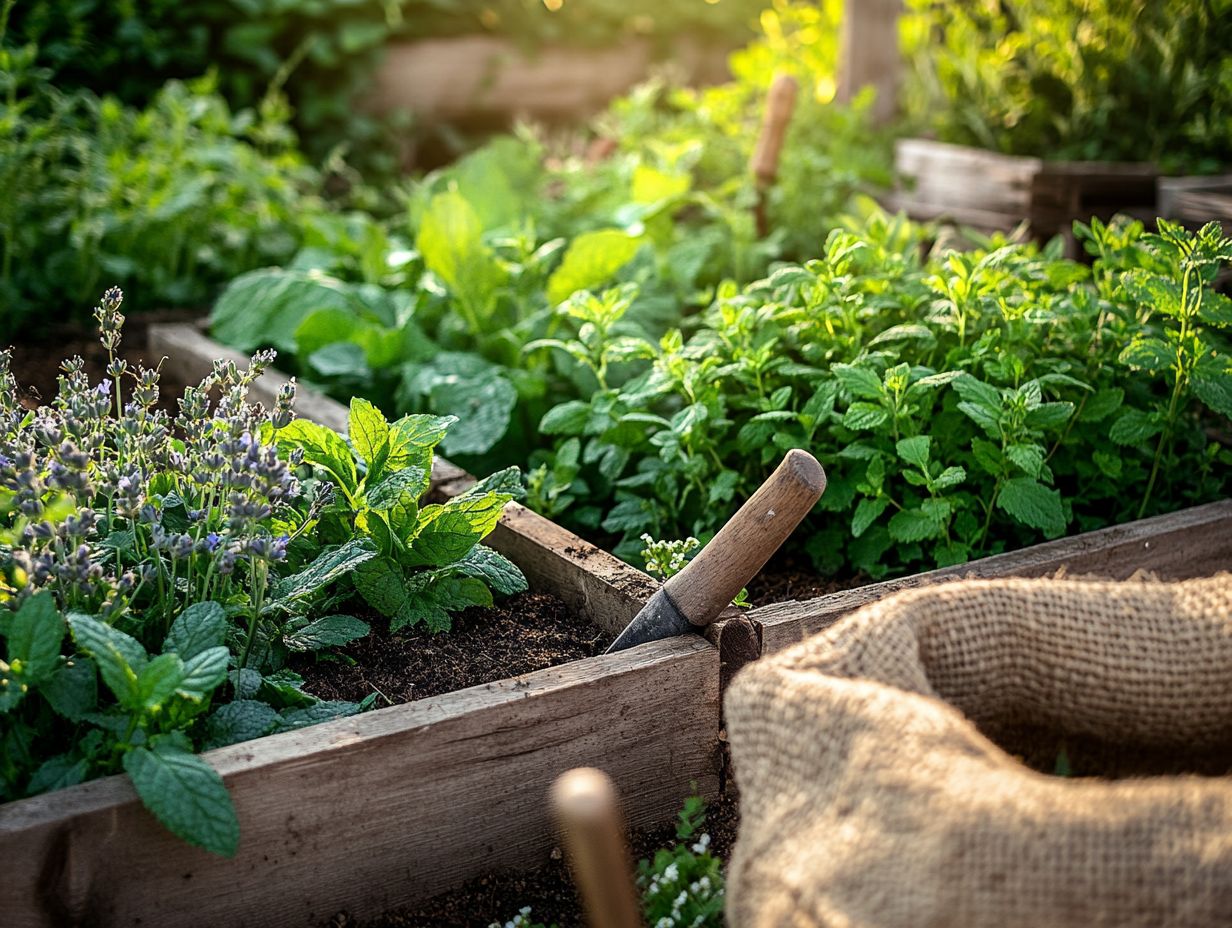
What is an herbal tea garden and why should I create one?
An herbal tea garden is a garden specifically designed for growing herbs that can be used to make tea. It can provide a sustainable and convenient source of fresh herbs for making your own natural herbal teas at home.
What are some common herbs that can be grown in an herbal tea garden?
Some common herbs that can be grown in an herbal tea garden are mint, chamomile, lavender, rosemary, lemon balm, and sage. These herbs are easy to grow and can be used for making a variety of teas.
How do I start creating my own herbal tea garden?
To start creating your own herbal tea garden, choose a suitable location, prepare the soil, and select the herbs you want to grow. You can either start from seeds or purchase seedlings from a nursery. It’s also important to research the specific needs of each herb and plan the layout of your garden accordingly.
What are some tips for maintaining an herbal tea garden?
To maintain a healthy herbal tea garden, water and fertilize your plants regularly. Remove any weeds that may compete with your herbs for nutrients and sunlight. Also, consider using natural pest control methods to keep your herbs free from harmful chemicals.
Can I use any type of soil for my herbal tea garden?
No, it’s important to use well-draining soil that is rich in organic matter for your herbal tea garden. Herbs can be sensitive to certain types of soil, so make sure to research the specific requirements of each herb before planting. You can also amend your soil with compost or other organic materials to improve its quality.
What are some ways to use the herbs from my herbal tea garden?
The herbs from your herbal tea garden can be used to make a variety of teas, as well as in cooking and for medicinal purposes. You can also dry and store the herbs for later use. Get creative and experiment with different combinations of herbs to create your own unique blends for teas and other recipes.
Start your herbal tea garden today for fresh flavors tomorrow!

